KATHMANDU: Prime Minister KP Oli has often faced criticism for his habitual tardiness to meetings.
This was the case again on November 25, when he invited former Prime Ministers and Foreign Ministers to discuss his upcoming visit to China.
However, when PM Oli failed to show up at the scheduled time, Madhav Nepal, who was attending the meeting, was about to leave.
Just as he was about to depart, tea was brought in, which allowed the meeting between PM Oli and Madhav Nepal to proceed.
The implementation of the Belt and Road Initiative (BRI) was a major point of discussion surrounding Prime Minister Oli’s visit to China.
There has been disagreement within the ruling coalition, particularly between the Nepali Congress and the UML, over whether Nepal should take a loan under the BRI framework.
In light of these discussions, we asked former Prime Minister and Chairman of the Unified Socialist Party, Madhav Kumar Nepal, what suggestions he had given to Prime Minister Oli regarding the BRI during their meeting on November 25.
We have communicated all of these points to the Prime Minister. The country’s approach to development needs to be reassessed, particularly in terms of evaluating the returns on investment.
The conversation also touched upon former Prime Minister Pushpa Kamal Dahal Prachanda’s recent interview with ‘The Hindu’, where he made some comments about India.
In response, Madhav Nepal mentioned that Oli and Prachanda had been “flirting” with each other for a while.
Regarding the meeting convened by the Prime Minister, Madhav Nepal was asked about the absence of former Prime Minister Baburam Bhattarai.
He explained, “Baburamji chose to boycott the meeting. I thought Sher Bahadur Deuba should have skipped all other programs and attended, but he did not show up either.”
On November 25, Prime Minister KP Oli held discussions with former prime ministers and former foreign ministers about his upcoming visit to China, particularly regarding the Belt and Road Initiative (BRI) agreement to be signed with China. What was the outcome?
During the meeting, the former Prime Ministrers shared their suggestions and opinions, focusing on the importance of the visit and its potential impact.
Regarding the visit, the main suggestion was that the timing of international visits should not be overly politicized.
“The focus should not be on which country to visit first but rather on the invitation received. We should prioritize visits based on necessity and mutual importance, regardless of political preferences. Both sides need to acknowledge the value of these exchanges,” Madhav Nepal leader explained.
“Nepal should not be bogged down in debates about the order of visits; what matters is the substance of the engagement.”
Another key point emphasized was the need to respect the sensitivities of Nepal’s neighboring countries.
“When visiting India and China, we must be mindful of their concerns. India is worried about the influence of Islamic extremists, while China has concerns regarding external interference related to Tibet. These sensitivities must be addressed to avoid any misunderstandings and to foster mutual trust, which will ultimately strengthen our bilateral relations.”
In terms of specific areas to focus on during the visit, the former PMs suggested that Nepal’s needs as a developing country should be a priority, particularly in addressing climate change, environmental challenges, and harnessing Nepal’s natural resources.
“Nepal has great potential in terms of tourism, particularly along its rivers and glaciers. We should also explore ways to generate green energy from our water resources and not let them go to waste,” according to a former PM.
The discussion also touched on the potential for increased electricity production, emphasizing the importance of developing Nepal’s energy sector for both domestic use and regional export.
“We should focus on producing electricity as green energy. Neighboring countries like India and Bangladesh have substantial energy demands, and we should explore ways to export electricity to these markets. There is no reason Nepal should face power shortages that impact our industries and factories,” they added.
Additionally, the meeting highlighted the importance of agriculture and food security, noting that the development of industries linked to agriculture could significantly contribute to job creation and economic growth.
The former PMs also suggested that Nepal should engage with China on micro-projects that align with Nepal’s development priorities.
“We should explore what specific projects the Chinese government is willing to prioritize and how they align with Nepal’s needs for long-term growth and sustainability.”
What about the BRI project?
I stated that the BRI project is not limited to just Nepal and China; it spans across countries in Africa and extends from Central Asia to South Asia. Many smaller nations have benefited from the BRI initiative.
To enhance our country’s production, we should approach the BRI in a way that benefits all parties involved.
This should be a partnership where the goal is mutual progress and self-improvement. In this context, Nepal should also look to benefit from the BRI.
It is important to note that the BRI is not a military organization, and Nepal does not seek cooperation with military alliances.
We should avoid engaging in projects that are strategic in nature or tied to military interests, such as metro systems that may have military implications.
Nepal must remain committed to a non-aligned foreign policy. We have presented ourselves to the world as a peaceful nation, and we should continue to do so.
Therefore, we should not pursue any projects linked to military alliances. Our national interests should be the priority, and even larger countries should respect that.
We have communicated all of these points to the Prime Minister. The country’s approach to development needs to be reassessed, particularly in terms of evaluating the returns on investment.
Is Prime Minister Oli in favor of implementing the BRI?
I didn’t specifically ask that. However, it’s not something that can be decided by him alone; after all, we have a coalition government.
We shared our advice with him because it was requested. That said, it’s not just about taking advice; it’s about moving forward and implementing it. He believes it is possible to move ahead with it.
Where is the disagreement between Nepali Congress and the UML regarding the BRI?
I didn’t have a chance to discuss that with the Nepali Congress party. I didn’t sit down with them to get into details.
I have long held the belief that we should not play one country against another. Whether it’s India or China, we should be clear in stating that we won’t use one country’s influence over the other.
From what I’ve heard, there seems to be some disagreement regarding whether the BRI should be treated as a loan or a grant, and whether there is a clear framework for it. NP Saud came, but I didn’t get the chance to hear his views either.
Why didn’t former Prime Minister Sher Bahadur Deuba and former PM Dr. Baburam Bhattarai attend the meeting?
Did Baburamji boycott the meeting? I wasn’t aware. I did think Sher Bahadur Deuba should have skipped other programs to attend, but he didn’t.
I felt a sense of relief, and I imagine Prachanda must have felt the same. We didn’t ask him directly. I heard later that he had a program in Janakpur.
Has the BRI been discussed with Sher Bahadur Deuba?
No, we haven’t discussed the BRI yet. We haven’t met recently.
Is there talk of the BRI bringing Madhav Nepal and KP Oli closer together?
I nearly left the meeting because it started late. I’m someone who values punctuality and believes that work should start on time.
I waited for about 15 minutes, but that’s my limit. Even when I worked with King Birendra on the constitution, I was always someone who didn’t tolerate waiting, even if it meant leaving early.
I also think that if the Prime Minister or anyone is busy, they should inform us in advance about delays.
On that day, I was about to leave when tea arrived just in time. After that, Prachanda came, and then Prime Minister Oli arrived, mentioning that Madhavji’s time is valuable as well.
Does remembering old times reflect a good relationship?
I don’t intend to sever ties with anyone, nor do I wish to form unnecessary relationships. I believe in maintaining good relationships with everyone, just like how Nepal should relate to others.
My relationships are strong with those who stand for the country, the people, and positive change. I believe people should be given a chance, but only when things are fair.
My relationship with Oli is not new—it dates back to 1972. When you have long-standing relationships with old friends, it’s natural that there are ups and downs. But I don’t seek conflict.
This is not only advice for the Prime Minister but also for my former colleagues and the experts in the Foreign Ministry. We can convince rational people if we are well-prepared.
I don’t want anything from anyone, nor do I want to give anything unnecessarily. My focus is on the country’s welfare. I do not tolerate insults, and I treat others with respect, expecting the same in return.
In the context of that day’s discussion, what were you and Prime Minister Oli laughing about?
When Prachanda spoke, he mentioned that Oli had made fun of him. Oli replied, “I haven’t made fun of anyone.” This came up when they were discussing not using the “country card” to pressure other nations during this visit.
I have long held the belief that we should not play one country against another. Whether it’s India or China, we should be clear in stating that we won’t use one country’s influence over the other.
Our approach should be based on values, beliefs, and a desire for peace, both regionally and globally, as well as human welfare.
The conversation was light-hearted; Oli sarcastically claimed not to know anything about the issue, while Prachanda clarified his statement.
How do you view Prime Minister Oli’s upcoming visit to China?
It seems quite natural. The real questions are: What should we urge China on, in terms of Nepal’s interests? How can we collaborate on development, construction, and trade?
What lessons can we learn from China, and how can we improve exchanges between the two countries? The BRI is a central topic, and I’ve been involved in many BRI projects worldwide.
We should discuss these matters openly. Our position on multipolarity is clear, and we must ensure that Nepal’s interests are prioritized in such international engagements.
Will the Prime Minister return after implementing the agreement during his visit to China?
I’m not sure what will happen internally now. However, I believe he should return having demonstrated diplomatic skill and successfully completing his tasks.
When I served as Foreign Minister for the first time, I participated in Prime Minister Manmohan Adhikari’s visit to India in 2051 BS.
I’m happy to have been part of reaching agreements on several issues, and I feel proud of that achievement.
For instance, I believe the Nijgadh Airport project should be prioritized. As you know, the Kaligandaki project is also being considered by the Asian Development Bank.
There can be gaps between leaders on certain issues, but the Prime Minister should work to bridge those gaps.
To make a strong case, it’s important to study the issues thoroughly and be well-informed.
It’s crucial to be fully prepared for the interests, aspirations, and questions of other countries.
This is not only advice for the Prime Minister but also for my former colleagues and the experts in the Foreign Ministry. We can convince rational people if we are well-prepared.
For example, I first proposed to Indian Prime Minister Narasimha Rao that the Bangladesh route was necessary for Nepal.
At first, he was not convinced, but I managed to persuade him. I believe China should also be open to persuasion. I suggest that the Prime Minister’s success will require skill, preparation, and courage.
Will his visit be fruitful?
I hope it will be fruitful. However, it wouldn’t be right for me to predict the outcome. We often tend to speak in haste and regret it later, but I prefer not to make rash statements.
Despite all this, there still seems to be no clear understanding of the BRI, right?
You’re right that the BRI is a global connectivity initiative. It aims to connect countries through various means: roads, railways, shipping, and airways, depending on what is feasible.
This approach is rooted in the principle of trade—buying goods where they are cheaper and improving the quality of those goods.
What’s wrong with that? It’s about connecting with the global market, not settling for subpar products.
The world has always sought to connect; in ancient times, trade was conducted on camels across seas, and now we have vast advances in IT and information.
The BRI will help with all these areas. However, the method must be appropriate—it should not be used recklessly or improperly.
The sovereignty and rules of each country must be respected, and the coexistence of nations should be acknowledged.
We should also work towards exporting fruits and vegetables free of pesticides. These are the kinds of issues we need to study and take action on.
During the Mahabharata period, people used weapons, but today, countries must acknowledge each other’s existence peacefully. That’s my stance.
Did you emphasize whether loans should be taken or grants should be given?
I didn’t specifically go into that. However, I do have serious concerns about the selection of projects.
For instance, I believe the Nijgadh Airport project should be prioritized. As you know, the Kaligandaki project is also being considered by the Asian Development Bank.
When I was Prime Minister, I pushed forward the Upper Tamakoshi Hydroelectric Project using Nepal’s own capital and human resources.
I also initiated efforts to expand education in Nepal. We should seek advice and suggestions from experts on such important matters.
We should bring in investment—let both India and China invest, as well as other countries. But it’s essential to get results from those investments.
Forests must be protected, and all these concerns must be addressed. Developed countries should assist underdeveloped ones.
A comprehensive study should be conducted for Nepal’s overall development. We must explore and realize the country’s potential. Decisions should not be rushed, and we must be cautious about what we say.
Grants should not be misused. Whether they are grants or loans, we must ensure they are used properly and yield positive results.
Again, the focus should be on investment—producing returns and making sure that the country’s revenue is increased. Exports should be promoted, and imports should be replaced where possible.
On that note, we should explore how to market Nepalese products—like buffalo, sheep, and deer—how to promote Karnali apples, Nepalese tea, and other agricultural products in the global market.
We should also work towards exporting fruits and vegetables free of pesticides. These are the kinds of issues we need to study and take action on.
I’ve heard that China has shown interest in these areas. If the Nepalese government requests help, everyone will offer suggestions.
However, if we don’t consider the return on investment, the country could face challenges. We need to be mindful of these factors.


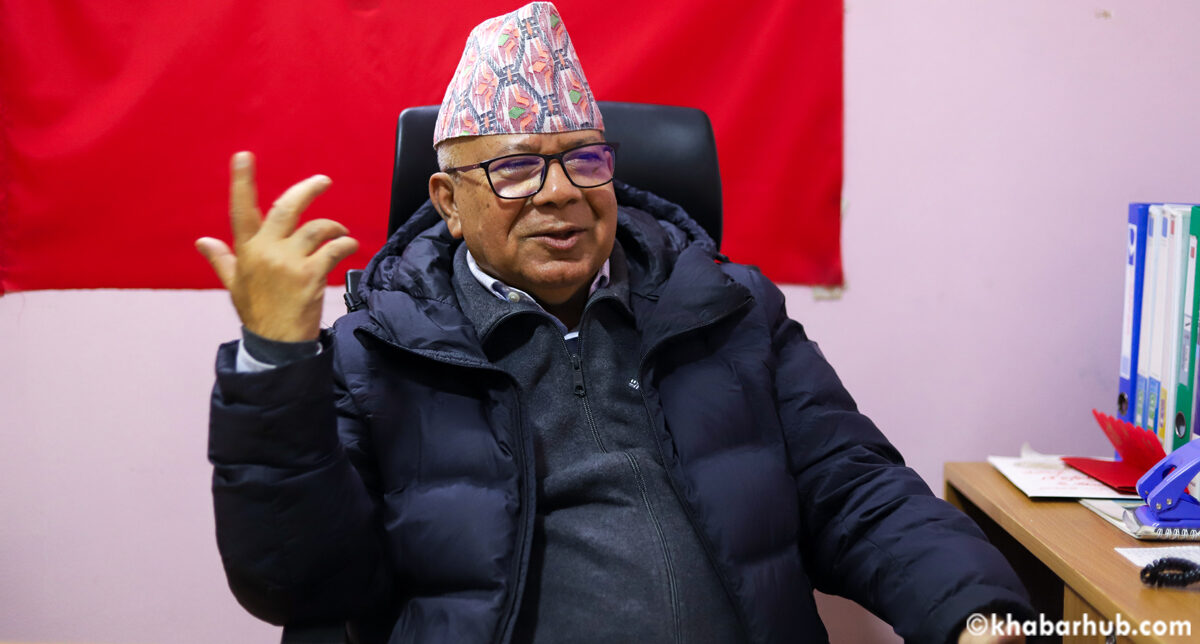
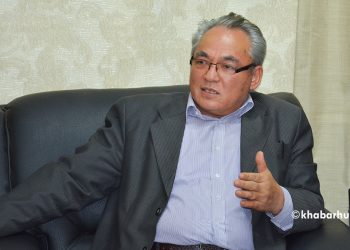
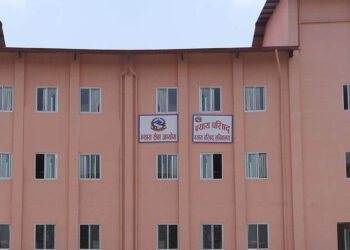
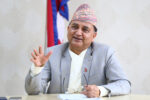
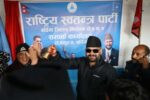

Comment